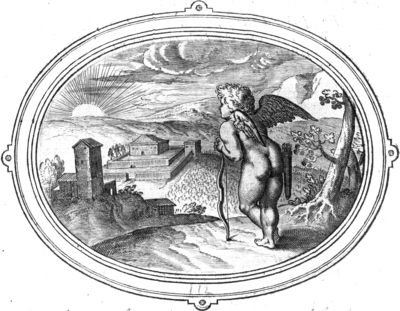Primo delectat, mox urit [112]

Translations
 |
Eerst behaaglijk, dan verschroeiend. |
 |
First delightful, then scorching. |
Literature
- Sebastiàn, Lectura crítica
 , p. 46
, p. 46
- Buschhoff, Liebesemblematik [...]
 , p. 119
, p. 119
Sources and parallels
- Primo delectat, mox urit [59] (in: Otto Vaenius, Emblemata aliquot selectiora amatoria (1618))
[Compare
![Compare [compare]](/static/images/compare2.gif) ]
]
-
Position of the sun related to love's intensity in: Hoe hoogher hoe heeter [18] (in: Pieter Cornelisz. Hooft, Emblemata amatoria (1611))
[Compare
![Compare [compare]](/static/images/compare2.gif) ]
]
-
Parallel for the pictura (mirrored, background less detailed) and for some mottoes (Latin, Italian, French) in: Un Amour regardant le Soleil levant (in: Daniel de la Feuille, Devises et emblemes (1691))
[Compare
![Compare [compare]](/static/images/compare2.gif) ]
]
References, across this site, to this page:
- Un Amour regardant le Soleil levant (in: Daniel de la Feuille, Devises et emblemes (1691))
- Hoe hoogher hoe heeter [18] (in: Pieter Cornelisz. Hooft, Emblemata amatoria (1611))
- Primo delectat, mox urit [59] (in: Otto Vaenius, Emblemata aliquot selectiora amatoria (1618))
Iconclass
A cupid staring at the rising sun- sunrise
[24A1]

- landscape with tower or castle
[25I5]

- contemplating nature
[43B11]

- archer's weapons: bow
[45C15(BOW)]

- quiver
[45C23]

- Pleasure, Enjoyment, Joy; 'Allegrezza', 'Allegrezza da le medaglie', 'Allegrezza, letitia e giubilo', 'Diletto', 'Piacere',
'Piacere honesto' (Ripa) (+ emblematical representation of concept)
[56B1(+4)]

- Pain, Sorrow, Sadness; 'Dolore', 'Dolore di Zeusi' (Ripa) (+ emblematical representation of concept)
[56BB1(+4)]

- (personifications and symbolic representations of) Love; 'Amore (secondo Seneca)' (Ripa) (+ emblematical representation of
concept)
[56F2(+4)]

- proverbs, sayings, etc. (with TEXT)
[86(PRIMO DELECTAT, MOX URIT)]

- other non-aggressive activities of Cupid
[92D156]

- attributes of Cupid (with NAME)
[92D18(BOW)]

- attributes of Cupid (with NAME)
[92D18(QUIVER)]

![[H O M E : Emblem Project Utrecht]](/static/images/rd-small.gif)


















































































































































